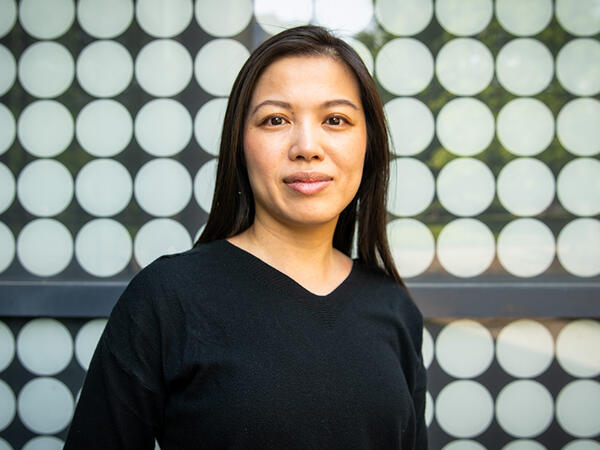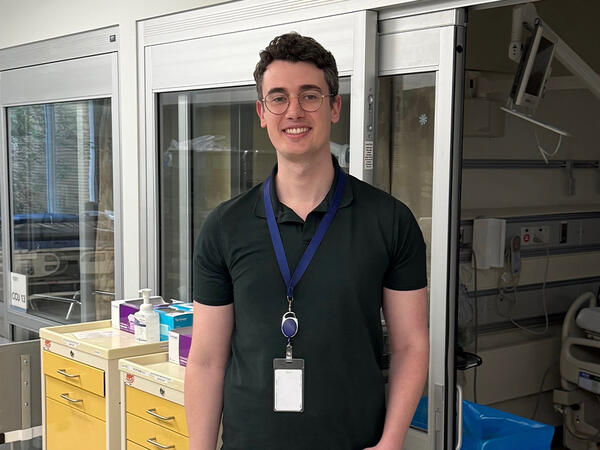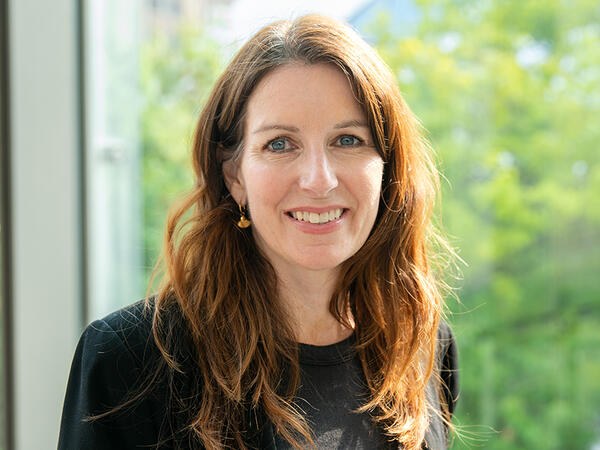Jamie Kellar of the Leslie Dan Faculty of Pharmacy has been recognized with a President’s Teaching Award from the University of Toronto, the highest honour for teaching that the University bestows.
The award recognizes teaching innovation and excellence, and comes with a five-year designation as a member of the President’s Teaching Academy, as well as a grant for $50,000 to support research and teaching activities.
“I was surprised by this award, and I’m delighted to join the teaching academy,” said Kellar, who is the associate dean, academic, and an associate professor (teaching stream) at the Leslie Dan Faculty of Pharmacy. “Funding support for teaching stream faculty can be challenging to secure, especially for qualitative health professions research, so I’m also grateful for this opportunity to build out my research program.”
The University calls on teaching academy members to discuss teaching issues as they arise, and to advise the vice-president & provost and the director of the Centre for Teaching Support & Innovation. Members also help with the University’s assessment of teaching and advocate for teaching excellence.
Kellar said the teaching academy offers an opportunity to learn how other faculties at U of T approach education. “The health professions can be a bit insular. We talk to medicine and nursing, but don’t get out of our lane too often,” she said. “The academy will provide exposure to world-class faculty with fresh ideas, and some of what we’re doing in Pharmacy is broadly applicable, so I hope to share those efforts as well.”
Kellar played a key role with Professor Beth Sproule in bringing more mental health content into the curriculum of the Doctor of Pharmacy (PharmD) program, which the Faculty established in 2011. That content emphasized clinical therapeutics, patient assessment skills and patient experiences.
Storytelling is an important aspect of the PharmD program’s mental health content, and in Kellar’s own approach to teaching. She often connects patients and caregivers with students in her classes, to share their experiences with mental health.
Kellar recently brought the mother of two boys with ADHD to an online class to talk about the experience of diagnosis, receiving prescriptions and medication concerns. The mother spoke on what pharmacists did well and could have done better, shared photos of her children, and revealed that her husband was diagnosed with the condition after learning more about it through the children.
“Teaching is not just imparting knowledge,” said Kellar. “It’s about understanding connections among people, their psycho-social context and how they experience illness — whether they will take drugs or not and why, for example. That’s much more useful and engaging for students.”
Kellar said she has long held a fondness for storytelling and farm lore, inspired through her upbringing in rural Ontario. As an undergraduate student at the University of Guelph, she found courses resonated most when teachers linked them to the real-world experiences of people, not just textbook examples.
“Stories are a great way to connect people, and when that happens, students will often seek out additional content themselves,” Kellar said.
Kellar has received three professor-of-the-year awards at the Leslie Dan Faculty of Pharmacy, voted on by students. She herself was inspired to pursue a mid-career PhD in the School of Health Professions Education at Maastricht University in the Netherlands.
The focus of Kellar’s doctoral research is professional identity, which includes how pharmacists view their profession and their role within it, as well as the influence of pharmacy education and professional organizations on pharmacists’ identity formation.
Kellar and her research team recently conducted a historical discourse analysis on professional identity in pharmacy education literature. They found five main professional identities associated with pharmacists: apothecary, dispenser, merchandiser, expert advisor, and health-care provider.
The health-care provider identity dominates today, the researchers showed, but the other identities are present in the discourse and may contribute to feelings of identity confusion and inadequacy among pharmacy students and pharmacists. Kellar received the 2020 Rufus A. Lyman Award for the work, which honours the best research paper in the American Journal of Pharmaceutical Education.
Kellar and her team are building on their discourse analysis research through qualitative studies. They have interviewed graduating PharmD students on their perceptions of professional identity, and will explore the views of first-year students this fall. The President’s Teaching Award funding will support that work, which Kellar hopes will grow to include practising pharmacists locally and then across Canada.
“Pharmacy is one of the only professions with a rich history of multiple identities. Instead of seeing that as a problem, we should celebrate it, and pharmacy education programs should embrace it,” said Kellar. “There are legitimate elements in each identity. Students and pharmacists should try them out and use as they see fit.”
By: Jim Oldfield
More News
Image

Welcoming Ivy Lam as Academic Lead in Climate, Health & Sustainable Care
Assistant Professor Lam will guide the Leslie Dan Faculty of Pharmacy's efforts to embed environmental sustainability across the Faculty.
Read More
Image

Pharmacy alum’s research shows how full-scope practice improves cancer care
Honoured with a national award, Adrian de Boer says his residency experience was a powerful reminder that he's making a meaningful change to the pharmacy profession.
Read More
Image

Pharmacy alum passionate about helping community pharmacists practice to full scope
As a pharmacy leader at Rexall, Heidi Wittke uses frontline experience to lead initiatives that improve patient care
Read More
